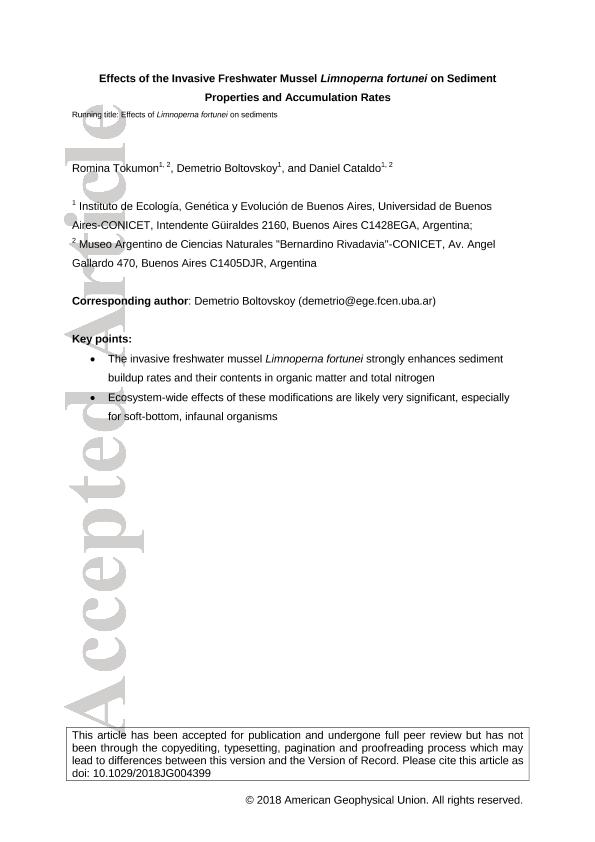Mostrar el registro sencillo del ítem
dc.contributor.author
Tokumon, Romina Andrea

dc.contributor.author
Boltovskoy, Demetrio

dc.contributor.author
Cataldo, Daniel Hugo

dc.date.available
2020-01-31T19:35:02Z
dc.date.issued
2018-06
dc.identifier.citation
Tokumon, Romina Andrea; Boltovskoy, Demetrio; Cataldo, Daniel Hugo; Effects of the Invasive Freshwater Mussel Limnoperna fortunei on Sediment Properties and Accumulation Rates; American Geophysical Union; Journal of Geophysical Research: Biogeosciences; 123; 6; 6-2018; 2002-2017
dc.identifier.issn
2169-8961
dc.identifier.uri
http://hdl.handle.net/11336/96411
dc.description.abstract
Since its introduction into South America around 1990, the freshwater bivalve Limnoperna fortunei (the golden mussel) has spread rapidly and is now a dominant component of the benthic and periphytic fauna in many rivers, lakes, and reservoirs. Sizable impacts of this nonindigenous species on nutrient recycling, plankton abundance and composition, and trophic relationships with fishes have been reported, but its effects on the sediments have received little attention. In this work, we use eighteen 20-L flow-through experimental units with and without mussels where changes in the mass and characteristics of the sediments accumulated throughout a yearly cycle in monthly, biannual, and annual intervals are analyzed. Experimental units with mussels yielded almost 2 times more sediments than units without mussels and contained significantly higher loads of organic matter and total N. Total P was not affected by the presence of mussels. Sediments accumulated in the biannual and annual experimental units agreed well with the yields of the monthly units, but the vertical stratification of organic matter, N, and P was unpatterned. Seasonal changes in the volume of total sediments, biodeposits, and their organic matter and N contents were positively associated with ambient water temperature and with intermediate (~150–250 NTU, nephelometric turbidity units) turbidity. Our results suggest that ecosystem-wide modifications in the living conditions of the benthic epifaunal and infaunal organisms in waterbodies invaded by the mussel are likely significant, although variable locally, regionally, and across taxa.
dc.format
application/pdf
dc.language.iso
eng
dc.publisher
American Geophysical Union

dc.rights
info:eu-repo/semantics/openAccess
dc.rights.uri
https://creativecommons.org/licenses/by-nc-sa/2.5/ar/
dc.subject
IMPACT, SEDIMENTS
dc.subject
LIMNOPERNA FORTUNEI
dc.subject
NITROGEN
dc.subject
ORGANIC MATTER
dc.subject
PHOSPHORUS
dc.subject.classification
Ecología

dc.subject.classification
Ciencias Biológicas

dc.subject.classification
CIENCIAS NATURALES Y EXACTAS

dc.title
Effects of the Invasive Freshwater Mussel Limnoperna fortunei on Sediment Properties and Accumulation Rates
dc.type
info:eu-repo/semantics/article
dc.type
info:ar-repo/semantics/artículo
dc.type
info:eu-repo/semantics/publishedVersion
dc.date.updated
2019-10-09T20:44:37Z
dc.journal.volume
123
dc.journal.number
6
dc.journal.pagination
2002-2017
dc.journal.pais
Estados Unidos

dc.description.fil
Fil: Tokumon, Romina Andrea. Consejo Nacional de Investigaciones Científicas y Técnicas. Oficina de Coordinación Administrativa Parque Centenario. Museo Argentino de Ciencias Naturales “Bernardino Rivadavia”; Argentina. Consejo Nacional de Investigaciones Científicas y Técnicas. Oficina de Coordinación Administrativa Ciudad Universitaria. Instituto de Ecología, Genética y Evolución de Buenos Aires. Universidad de Buenos Aires. Facultad de Ciencias Exactas y Naturales. Instituto de Ecología, Genética y Evolución de Buenos Aires; Argentina
dc.description.fil
Fil: Boltovskoy, Demetrio. Consejo Nacional de Investigaciones Científicas y Técnicas. Oficina de Coordinación Administrativa Ciudad Universitaria. Instituto de Ecología, Genética y Evolución de Buenos Aires. Universidad de Buenos Aires. Facultad de Ciencias Exactas y Naturales. Instituto de Ecología, Genética y Evolución de Buenos Aires; Argentina
dc.description.fil
Fil: Cataldo, Daniel Hugo. Consejo Nacional de Investigaciones Científicas y Técnicas. Oficina de Coordinación Administrativa Parque Centenario. Museo Argentino de Ciencias Naturales “Bernardino Rivadavia”; Argentina. Consejo Nacional de Investigaciones Científicas y Técnicas. Oficina de Coordinación Administrativa Ciudad Universitaria. Instituto de Ecología, Genética y Evolución de Buenos Aires. Universidad de Buenos Aires. Facultad de Ciencias Exactas y Naturales. Instituto de Ecología, Genética y Evolución de Buenos Aires; Argentina
dc.journal.title
Journal of Geophysical Research: Biogeosciences

dc.relation.alternativeid
info:eu-repo/semantics/altIdentifier/doi/https://doi.org/10.1029/2018JG004399
dc.relation.alternativeid
info:eu-repo/semantics/altIdentifier/url/https://agupubs.onlinelibrary.wiley.com/doi/abs/10.1029/2018JG004399
Archivos asociados
